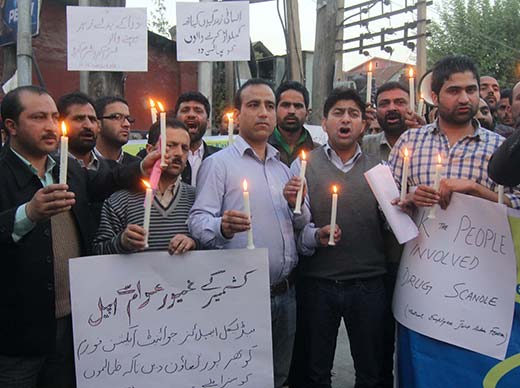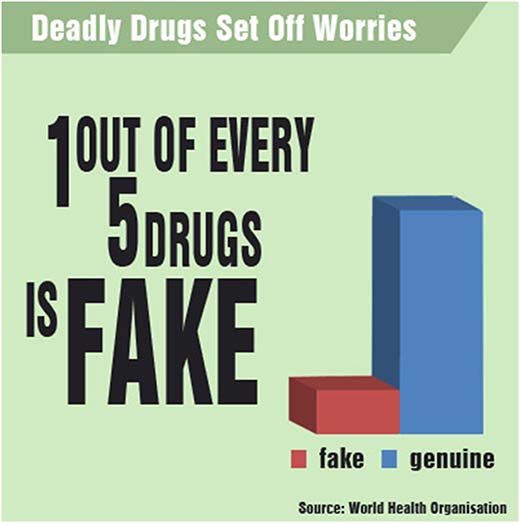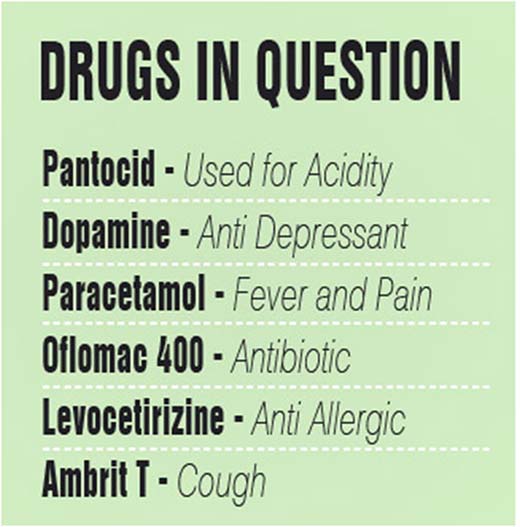With one out of five drugs fake in the market, it is the consumers who suffer. Qazi Zaid takes a look at the faulty supply chain and lack of infrastructure and will to check the menace
 Abdul Aleem, 67, a resident of Hyderpora, returned to Kashmir after visiting his son in America. Aleem has to use penicillin as he is suffering from diabetes. The quantity in which he was taking penicillin in America had to be increased five times to get the desired effect. Instead of 5 units, 25 units had to be used. Farhan Malik, Aleem’s neighbor and a doctor says that Aleem’s case is not special. There are many similar cases in SMHS hospital, where he practices, where the drugs do not have the effect they are supposed to have. “We prescribe medicines to patients according to the diagnosis, but the medicines they get in the local market do not seem to have the effect that they should. We prescribe the medications and ask the patients to get drugs made by foreign companies. In many cases where the patient is consuming drugs made by local companies, they show no improvement at all,” says Farhan.
Abdul Aleem, 67, a resident of Hyderpora, returned to Kashmir after visiting his son in America. Aleem has to use penicillin as he is suffering from diabetes. The quantity in which he was taking penicillin in America had to be increased five times to get the desired effect. Instead of 5 units, 25 units had to be used. Farhan Malik, Aleem’s neighbor and a doctor says that Aleem’s case is not special. There are many similar cases in SMHS hospital, where he practices, where the drugs do not have the effect they are supposed to have. “We prescribe medicines to patients according to the diagnosis, but the medicines they get in the local market do not seem to have the effect that they should. We prescribe the medications and ask the patients to get drugs made by foreign companies. In many cases where the patient is consuming drugs made by local companies, they show no improvement at all,” says Farhan.
The Chemists prefer to sell medicines of local make since profit margin is more. “The profit margin is slightly more in the drugs which are made by local companies. Companies which are foreign, have a relatively lesser margin for profit. I do not prefer to sell medicines for profit alone, customer satisfaction is my priority, but one can’t say that about everyone,” says Muzaffar Bhat, a chemist in Srinagar. “We can only ensure that the printed dates of manufacturing are ok and prices correspond to market rates, if the rates are cheaper one perceives something may be wrong. Print quality also sometimes suggests that it may be printed locally and something may be wrong with the batch, in that case we prefer not to buy the stock,” he adds.
Last year the drug control department of Jammu and Kashmir found that antibiotics supplied to several government hospitals in Srinagar were fake. The scam came to light when an order worth rupees eight lakh for the antibiotics failed a laboratory analysis. The findings were followed by a Valley-wide shutdown call by the Doctors Association of Kashmir and protests on the street, where people came out holding candles. A strike was also called by Hurriyat patriarch Syed Ali Geelani.
The Drugs in question were manufactured by a company, Affy Parentals at Solan in Himachal Pradesh and distributed by Jammu-based Lifeline Pharmaceutical Traders and Surgicals. The company denied selling the drugs to the hospitals, which further complicated the situation, pointing to forgery of labels of drug companies. One antibiotic was found to contain no active ingredient when tested for authenticity in a government lab. The test results were not revealed until almost one lakh pills were dispensed.
Drug consumers remain totally at the mercy of the market for quality products. Aisha Amin, 79, is a regular consumer of drugs like aspirin. “My blood pressure has to be kept under control and I have to use prescribed drugs for it, with news of fake drugs in the market, one is wary of the substance that one is consuming. I don’t know if it is benefiting me or harming me, if I am actually consuming a drug or just chalk, or worse, poison,” says Aisha.
 An RTI query revealed that between 10 and 20 per cent of drugs are fake in states like Uttar Pradesh, Tamil Nadu, Bihar, Gujarat and Maharashtra. In Uttar Pradesh 130 out of 800 drugs were found to be fake. Last year 162 drugs out of 1000 were found to be fake, the RTI reply said. The figures for Kashmir are estimated to be much higher.
An RTI query revealed that between 10 and 20 per cent of drugs are fake in states like Uttar Pradesh, Tamil Nadu, Bihar, Gujarat and Maharashtra. In Uttar Pradesh 130 out of 800 drugs were found to be fake. Last year 162 drugs out of 1000 were found to be fake, the RTI reply said. The figures for Kashmir are estimated to be much higher.
Market distributors do not directly supply to the hospitals. Hospital administration puts out a tender and then suppliers approach the administration with their quotations. “There is less chance of spurious drugs being available in the market. Distributors who supply to the market get supplies directly from the company. Companies have a reputation to maintain. In case of hospital supplies, when the administration opts to give contacts to suppliers which give drugs at cheaper rates, problems may arise. To lower budget expenditure, hospitals may be at a risk of compromising with the quality of the drugs they buy,” says Sameer, a local distributor of drugs.
Reputed companies themselves are under scrutiny. While talking to a newspaper, India’s top drug regulator, G N Singh said that if he had to follow US standards while inspecting facilities supplying to Indian market, all of them would have to be shut down.
Drugs which are being exported to other countries are also not up to the mark. USA based food and Drug Administration inspected 160 Indian drug plants last year and found many of the plants to be producing sub-standard drugs. India’s biggest drug manufacturer Ranbaxy was levied a fine of $500 million, the largest ever levied against a generic company.
Counterfeit medicines are being suspected behind recent spree of infant deaths in the G B Pant hospital in Kashmir. Two years after the public outcry over the incident, the state government gave a clean chit to the then medical Superintendent, Dr Javaid Chowdhary. He was reinstated in the Government Medical College, Srinagar on the post equivalent to his earlier post of HoD Pediatrics.
There have been hundreds of deaths in recent years. Surveys conducted by World Health Organisation (WHO) found that 12 per cent of medicines were fake or tainted with substances like talcum powder or chalk. Thousands of deaths of infants and pregnant women have been linked to the production of Maximizin-625, an antibiotic used to prevent infection in post-surgery patients.
 Owner of a reputed hospital in Srinagar, which has now become a status symbol for the middle class to get treated in, says “There is no way we can check the drugs for quality since we do not have facilities to do quality checks. We depend solely on the supplier and the best we can do is buy from a reliable and reputed distributer. It is important for us because we are responsible for people’s lives and have to do our best to ensure that no harm comes to those who put their trust in us.” The Owner wished not to be named. Hospitals who buy from reliable distributors to ensure quality can still be at risk since the facilities that produce these drugs are themselves in question for supplying below the marked products.
Owner of a reputed hospital in Srinagar, which has now become a status symbol for the middle class to get treated in, says “There is no way we can check the drugs for quality since we do not have facilities to do quality checks. We depend solely on the supplier and the best we can do is buy from a reliable and reputed distributer. It is important for us because we are responsible for people’s lives and have to do our best to ensure that no harm comes to those who put their trust in us.” The Owner wished not to be named. Hospitals who buy from reliable distributors to ensure quality can still be at risk since the facilities that produce these drugs are themselves in question for supplying below the marked products.
While everyone in Kashmir, including consumers, distributors and prescribers are worried about the medicines they buy, there is not much of a choice. Government departments have been unable to effectively curb the menace of spurious drugs in the valley. With the same problem being seen outside the valley, the solution does not look close at hand. For now, the issue of spurious drugs in the state persists and may continue to persist until strict measures are taken by the government to overcome these problems and provide relief to the consumers.















